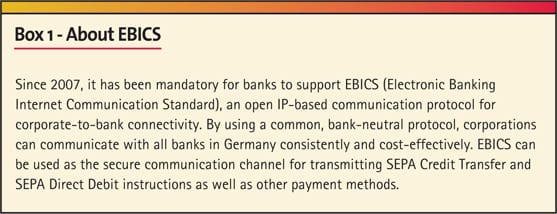After the Ballots
How the ‘year of elections’ reshaped treasury priorities
Published: May 14, 2014

Treasurers and cash managers in Germany are familiar and confident with the use of EBICS to communicate with their banks for domestic payments and cash management. An innovative new proposition from BNP Paribas, ’Global EBICS’, provides the ability to leverage EBICS not only domestically, but regionally or even globally.
EBICS (Electronic Banking Internet Communication Standard) is the most commonly used communication channel in Germany, used by around 95% of corporations. Treasurers and finance managers are attracted to high levels of security, signature workflow and the ability to communicate in a consistent way with all banks in Germany using standard formats. Furthermore, EBICS can be integrated with the company’s ERP (enterprise resource planning) system and/or TMS (treasury management system).

As a major cash management bank in Germany, we at BNP Paribas are committed to supporting our customers’ payments and cash management requirements both within Germany and internationally. With most of our customers in Germany connecting to the bank via EBICS, we wanted to extend the same convenience, security and standardisation to their cash management business globally. To achieve this, we have expanded the use of EBICS across our entire network (‘Global EBICS’), enabling customers in Germany to leverage EBICS as a single, convenient and familiar protocol for their cash management activities, such as making payments and retrieving bank statements, not only domestically, but wherever in the world they do business with BNP Paribas.
The ‘Global EBICS’ solution also enables our corporate customers to benefit from the value-added services offered by BNP Paribas at a global level, such as:
Furthermore, as Martin Postweiler, Treasury Intelligence Solutions GmbH demonstrates (Box 2), Global EBICs is highly complementary with corporate cash and treasury management solutions.

The ability to leverage EBICS for global cash management, rather than simply domestic cash management, has been received enthusiastically by customers across a wide range of industries, particularly mid-market companies (the so-called Mittelstand segment). Many of our German customers work with BNP Paribas in a number of countries globally, or are planning to do so, so they recognise the benefits of leveraging a single communication channel globally, rather than implementing a separate channel for international cash management. Furthermore, it allows companies that currently use multiple channels to rationalise these and replace them with EBICS, improving controls and reducing costs.[[[PAGE]]]

An important catalyst for many of BNP Paribas’ customers’ treasury and cash management optimisation projects, such as centralisation or enhanced bank connectivity, is the introduction of SEPA. Most companies migrated to SEPA payment instruments on an ‘as is’ basis i.e., without changing their business processes or organisational structures. Now that most companies in Germany have achieved SEPA compliance, or are in the final stages of doing so, treasurers and finance managers are assessing the opportunities of a harmonised payment landscape. In particular, we are seeing a strong focus on centralisation, standardisation and rationalisation of banks, accounts and channels, not only in the Eurozone but more widely.
There is a clear value proposition, for example, to centralising payments through a payment factory or shared service centre (SSC). This is easier to achieve in a post-SEPA environment with consistent payment instruments across the Eurozone. Furthermore, ISO 20022 formats, on which SEPA payments are based, are fast becoming recognised as a global standard and can be used beyond SEPA both for cross-border payments but also for other domestic payment/collections methods (such as confirming in Spain, LCR in France or RIBA in Italy). As an active member of CGI, BNP Paribas is closely involved with the definition of guidelines to expand the usage of ISO 20022 messages.
As corporates in Germany already have EBICS in place, treasury or payments centralisation projects are often easier than in other countries where no standard payments protocol exist. However, in the past the use of EBICS has been restricted to debit/credit domestic accounts so companies have been obliged to introduce an additional channel should they need to manage non-German accounts. One such option is SWIFT, which is well-established as the industry standard for global bank connectivity, and offers a range of distinct benefits, particularly for multi-banked corporations; indeed, BNP Paribas is a strong proponent of SWIFT and supports the largest number of corporate customers using SWIFT of any bank globally.

However, companies in Germany that have already integrated with EBICS, and/ or work with BNP Paribas as their primary cash management bank, are often keen to leverage their existing skills and infrastructure rather than introducing another channel with the associated impact on their existing internal organisation. Consequently, the ability to expand the use of EBICS from domestic to international cash management is a compelling proposition, as Thomas Woelk, Head of Corporate Treasury, Wacker Neuson SE notes (Box 3). In particular, treasurers and finance can leverage an existing channel to:
In summary, BNP Paribas has enhanced the market-leading communication standard EBICS from a purely domestic German channel to a global one. It now offers multinational corporates the ability to use EBICS on a global scale, with particular applicability for payments centralisation. With SEPA migration now coming to an end, an increasing number of corporates are now likely to migrate to payment factories, and BNP Paribas’ global EBICS offer will be an attractive proposition.
